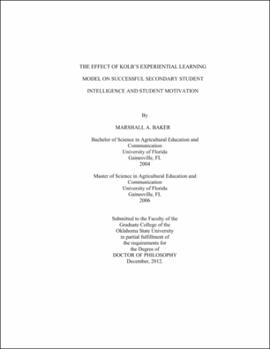| dc.contributor.advisor | Robinson, J. Shane | |
| dc.contributor.author | Baker, Marshall Alan | |
| dc.date.accessioned | 2013-11-26T08:22:17Z | |
| dc.date.available | 2013-11-26T08:22:17Z | |
| dc.date.issued | 2012-12 | |
| dc.identifier.uri | https://hdl.handle.net/11244/6553 | |
| dc.description.abstract | Experiential learning, as defined by Kolb (1984), is an important pedagogical approach used in secondary agricultural education. Though anecdotal evidence supports the use of experiential learning, a paucity of empirical research exists supporting this approach. The purpose of the study was to examine the effects of an experiential learning approach to instruction on secondary agricultural education students' successful intelligence and motivation for the course and knowledge retention. The experimental examination compared the commonly used DI approach to experiential learning, and investigated the interaction between students' learning style and instructional approach. The study was framed by three research questions: (1) What interactions exist between students' preferred learning styles, successful intelligence, and the instructional approach chosen? (2) What statistically significant differences exist in students' successful intelligence and motivation for the course between experiential learning and direct instruction approaches? (3) Do the analytical effects achieved by experiential and direct instructional approaches persist over time? Data were analyzed using a CRF - 22 and SPF 2.3 design. It was concluded that experiential learning led to higher domain specific creativity and practical use of knowledge, while direct instruction yielded higher practical knowledge scores. There were no statistically significant differences in motivation based on instructional approach. Also, it was concluded that, though students in both groups demonstrated a statistically significant increase in analytical scores, those gains significantly decreased for both treatment groups six weeks after the instruction. Thus, it was recommended that agricultural educators utilize a blended approach of instruction to provide balanced growth in all four modes of learning. Also, methods of assessment should be expanded to include not only analytical examinations, but also practical and domain specific creative measures. Experiential learning is an effective pedagogical approach when designed purposefully to meet each of the four learning modes inherent in Kolb's (1984) ELT model. | |
| dc.format | application/pdf | |
| dc.language | en_US | |
| dc.rights | Copyright is held by the author who has granted the Oklahoma State University Library the non-exclusive right to share this material in its institutional repository. Contact Digital Library Services at lib-dls@okstate.edu or 405-744-9161 for the permission policy on the use, reproduction or distribution of this material. | |
| dc.title | Effect of Kolb's experiential learning model on successful secondary student intelligence and student motivation | |
| dc.contributor.committeeMember | Terry, Howard Robert | |
| dc.contributor.committeeMember | Kelsey, Kathleen D. | |
| dc.contributor.committeeMember | Montgomery, Diane | |
| dc.contributor.committeeMember | Fuqua, Dale R. | |
| osu.filename | Baker_okstate_0664D_12576.pdf | |
| osu.accesstype | Open Access | |
| dc.type.genre | Dissertation | |
| dc.type.material | Text | |
| dc.subject.keywords | agricultural education | |
| dc.subject.keywords | experiential learning | |
| dc.subject.keywords | motivation | |
| dc.subject.keywords | stem | |
| dc.subject.keywords | successful intelligence | |
| thesis.degree.discipline | Agricultural Education | |
| thesis.degree.grantor | Oklahoma State University | |
